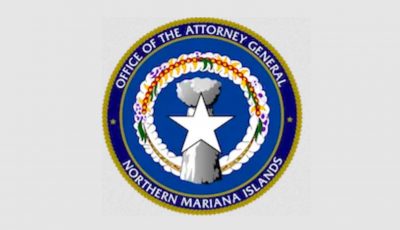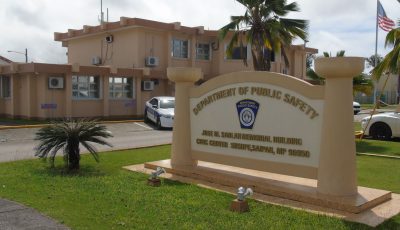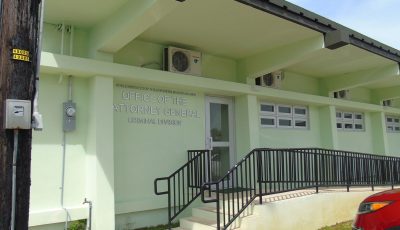Judge Wiseman asks high court to deny Ogumoro’s petition
Judge says former DPS official distorts the law, contorts the facts
Superior Court Associate Judge David A. Wiseman has filed a brief asking the CNMI Supreme Court to deny the petition of former Department of Public Safety deputy commissioner Ambrosio T. Ogumoro to restrain him from presiding over Ogumoro’s pending criminal case.
In his amicus curiae brief filed last week, Wiseman asserted that Ogumoro “distorts the law, contorts the facts, and makes giant leaps” in the hopes that the Supreme Court will grant him extraordinary relief.
An amicus curiae (“friend of the court”) is a brief filed in court by any entity who is not a party to the case.
Wiseman said Ogumoro must convince the high court that his [Wiseman’s] error is so plainly wrong that a writ of prohibition should be issued to correct the error.
The judge said Ogumoro failed to meet his burden of showing that the high court should grant the “drastic” and extraordinary remedy of issuing a writ.
Wiseman filed the brief in response to Ogumoro’s recent filing of a request for a writ of prohibition. Ogumoro, through counsel Edward C. Arriola, argued that Wiseman’s decision not to dismiss the case for lack of jurisdiction is erroneous because there is neither a rational nor a substantial legal argument to deny the CNMI Supreme Court’s order.
But Wiseman argued that extraordinary relief such as the one Ogumoro seeks is a “drastic one”—to be involved only in extraordinary situations where “circumstances amounting to a judicial ‘usurpation of power’ will justify the invocation of this extraordinary remedy.”
Wiseman said when a petitioner seeks such relief, he or she has the burden to convince the court that issuance of the writ would not lead to its unprincipled use—or that its issuance would not “operate to undermine the mutual respect generally existing between trial and appellate courts.”
Wiseman said that contrary to Ogumoro’s erroneous framing of the issue, the issue before the high court is not simply a matter of whether he (Wiseman) clearly erred in not recusing himself from the bench.
Rather, the judge said, the issue is whether Ogumoro satisfied his extraordinary burden that Wiseman’s decision to not recuse himself was so plainly wrong as to “indicate failure to comprehend or refusal to be guided by unambiguous provisions of a statute or settled common law doctrine.”
Wiseman said it appears to him that Ogumoro merely seeks to re-litigate his case in the hopes of a favorable outcome.
He said Ogumoro’s “misstatements of facts and misstatements of the law” make a weak case for issuance of an extraordinary writ.
The judge asserted that Ogumoro misstates the law for the “clearly erroneous” standard and misstates the facts in a misguided effort to win his case.
Wiseman pointed out that Ogumoro’s essential argument is that since Superior Court Associate Judge Kenneth L. Govendo recused himself from the questioned-case for judging the testimony about Ogumoro in a trial that he presided over, so too should Wiseman because he reviewed and approved the affidavit in support of an arrest warrant, which detailed “highly incriminating testimony” about Ogumoro in a pre-arraignment procedure.
Wiseman said Ogumoro’s premise for making his argument is that presiding over a trial and issuing a warrant of arrest is the same thing.
“There is a leap of logic here that any reasonable person should view with the upmost skepticism,” the judge pointed out.
Furthermore, Wiseman said, Ogumoro attempts to mislead the high court with unsupported factual allegations regarding Govendo’s decision to recuse himself from an earlier proceeding.
Wiseman cited that Ogumoro writes: “Accordingly, Judge Govendo reasonably considered whether a reasonable person might question his impartiality and rightfully recuse himself.”
“This could very well be true, but how can petitioner-defendant present his allegation to this court as fact?” Wiseman asked.
Wiseman said nowhere under the Commonwealth’s self-recusal statute does it say that if a judge recused himself or herself, it must have been because he or she “reasonably considered whether a reasonable person might question his [or her] impartiality.”
Wiseman said if Ogumoro must contort the facts to present his case, then he fails to show that his ruling was plainly wrong.
Wiseman said when Ogumoro presents to the high court that he (Wiseman) “reasonably believed” that Ogumoro committed the accused crimes—those factual allegations are unsubstantiated accusations, at best.
In fact, he said, Ogumoro accused him of “reasonably believing” in Ogumoro’s guilt no less than 12 times, and presents them as fact in his 15-page brief.
Wiseman said Ogumoro’s argument that he should have recused himself because the Commonwealth does not have a grand jury system has no basis in the law of self-recusal.
In Ogumoro’s petition, Arriola asserted that Wiseman’s decision to take the July 18, 2013, evidentiary hearing off calendar and declare the hearing “moot” because of the stipulation of the Office of the Attorney General and the Office of the Public Auditor violates the Supreme Court’s mandate.
Arriola said the Supreme Court ordered the Superior Court “to hold a hearing regarding the OAG’s disqualification.”
In addition, Arriola said, the high court stayed or suspended the case against Ogumoro and other related criminal proceedings “pending the trial court’s resolution of the OAG disqualification issue.”
OPA charged Ogumoro with 15 criminal offenses for his role in, among other things, shielding then-attorney general Edward Buckingham from being served with penal summons in August 2012.



























